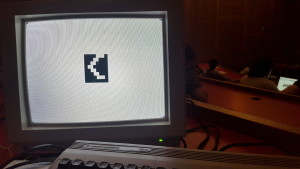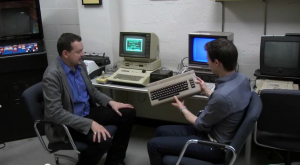I had five productions (one of them a collaboration) this time around at @Party, the Boston-area demoparty.
Browser demo: “More Tongue.” This was, well, not really a standard demo, even for a browser demo, that generates nonsense poems with compact code. Like everything at demoparties, it’s been released, but I’m going to work on a post-party version, so I’m leaving the party version out of this list.
Wild: “Shortcat.”
Shortcat is a very simple encoding scheme to make bytes (thus computer programs) into pleasing Unicode tweets, IMs, etc. #demoscene
Encoder: cat x.prg | perl -pe 'binmode STDOUT,":utf8";tr/\x00-\xff/\x{2500}-\x{25ff}/;' > x.txt #demoscene
Decoder: cat x.txt | perl -pe 's/[\x00-\x7f]//g;s/\xe2(.)(.)[^\xe2]\*/chr((ord($1)-148)\*64+ord($2)-128)/eg;' > x.prg #demoscene
To decode, copy the Shortcat string to a new text file, save it, decode. ASCII (incl. spaces & newlines) will be ignored #demoscene
When decoding, don’t include other Unicode besides the Shortcat string in your selection #demoscene
Add a hashtag (e.g., #c64) and/or other info (e.g., SYS4096) to help people run the program. That’s it. Nanointros everywhere! #demoscene
Check this Tweet for an example.
Executable music: “Dial Up” by devourant & nom de nom.
((((t\*2^12018^t>>16)&42)\*(t^12)&t>>5)>>3|t\*9&(t&4^42)>>5)-1
Intro: “Chronon,” a 32-byte Commodore 64 program.

Demo: “PET Code,” a 128-byte Commodore 64 program that is a demake of Jörg Piringer’s “Unicode.”
PRG file, demo version (runs once & ends). PRG file, looping version. Source.
Thanks to Metoikos, Dr. Claw, Luis, and other organizers and volunteers for putting this year’s party on – and to Boston Cyberarts and the sponsors of the event.



